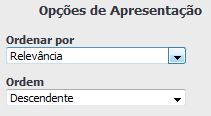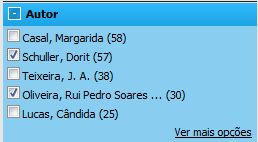Help
Help Contents
About RCAAP content
The RCAAP portal is an aggregator (meta-repository) that collects the description (metadata) of documents deposited in various institutional repositories in Portugal. The portal saves the full text of these documents to improve the search results but does not save any document.
When selecting the title of a document at search results in the RCAAP portal, you access to their full content in the repository where the document is.So that when difficulties arise in view or download the document that it should be the repository in question and not the portal RCAAP.
In addition to being able to search the Portuguese scientific production, you can also choose to search the Brazilian scientific production which currently is comprised of several repositories and journals aggregated by OASIS project.
The portal RCAAP tries to collect only the scientific literature and academic full text of which is in free access. However, there may be some documents that do not meet these requirements, or may be restricted due to embargoes or may not contain the full text of the document, only metadata records.
Simple Search
To perform searches on the homepage of the RCAAP Portal (as we call Simple Search) simply enteroneor morewords (search terms). The default search retrieves Brazilian and Portuguese records.
You can choose to search only records by clicking in Portuguese flag.
If you enter multiple words, it will only retrieve documents containing all words entered in the search box.
If you want to search an exact term, enter it in quotes, eg: "classification of chemical reactions".
Use truncation (*) to return to the same root word. For example, "educ*" retrieves "education" and "educating", "educate", "education", etc...
The search engine makes no distinction between upper and lower case, nor does it accents or diacritical marks. So, if you search "Consciousness" or "consciousness" will return the same number of documents.
To remove a search term, use the symbol - in front of the word such as "chemical-reaction" in this case to display all documents with the word "chemical" but do not have the word "reaction".
The search engine ignores words (the, of,etc...). Common and isolated characters (a, e, o), terms such as "http" and ".com", because they are rarely meaningful and useful for search.
Advanced Search
With advanced search you can define from the beginning a set of criteria for your search, increasing its accuracy and limited number of documents that you will find.
By clicking on their icons, you can switch between the scope of research resource records only from Portugal or Portugal and Brazil cumulatively.

- Search Fields
-
The search fields let you select up to three separate fields based on four options (Title, Subject, Author and Description). In this way, may appoint up to three search terms located in different contexts of the document. In addition, you can also combine terms with Boolean operators AND, OR and NOT.
In our example, will be carried out a search for a document containing the title with the root word "language" with "Peter" in the name of the author and do not contain the root word "program" in the subject.
- Display Options

-
The display options let you define how search results should be grouped and sorted. By default, results are sorted by relevance, but may also choose to sort them by date. Moreover, the sort can be ascending or descending order for each case.
- Filters
- Filters allow you to make restrictions based on the following aspects:
- Date: You can limit results to one year or a certain period of time. Default is selected the document date of the oldest and newest.
Filter by date
- Document Type: You can restrict your search to one or several types of documents.
- Filter by document type
- Language: Filter results by language of documents.
- Filter by language
- Repository: Restricts the results to one or more repositories available.
- Filter by repository
- Date: You can limit results to one year or a certain period of time. Default is selected the document date of the oldest and newest.
Results List
The results list displays all the records found in your search by relevance and sorted in descending order, if you have not changed your presentation. From the list of results you can refine the results, access to the original document in the repository where it is deposited, or find out more about the document:
The results list can be refined through the various filters available
- Author - The results list can be refined through the various filters available
- Date - Displays the dates of the most common set of records
- Document Types - Indicates the types of documents and the number of occurrences in the list of results
- Repository - Displays the number of records in each repository
- Subject - Displays the number of records in each repository
To reduce the number of results of your search, select one or more items from each group of filter (Author, Date, Document Type, Document Repository and Subject) and then click Update.
1º Select one of the items by which to filter

2º Select Update
![]()
To access the full text of the document, which is deposited in the repository, you must click on the document title.
The details of the document are obtained via the link "More info." at the bottom right of each record.
Details of the Document
This page shows you all the information available about the document you selected. From this page you can view the document in the source repository or select a related document.
You can check if the author has a curriculum in DeGóis Curriculum System by clicking the icon.
The records can be directly shared in Delicious, LinkedIN, Twitter or Facebook, wherever you find something relevant.
You can also export the records for some references management tools such as EndNote, BibTeX and Mendeley.
Authors can also track their scientific production in DeGóis in their resume. Just click the icon DeGóis, indicate your login information and choose the subject area of the document.
Directory
The Directory displays the repositories and information sources that integrate RCAAP Portal. It group repositories by type of institution and provides basic information and some characteristics of each one. You can view the evolution of the repository over the past 12 months, as well as listing all the records of that resource. You can also share these resources via Delicious, Facebook, Twitter and LinkedIn.
For each resource are given the characteristics of interoperability between systems and national and international standards.
 Driver - The feature complies with the minimum requirements of interoperability guidelines DRIVER 2.0. More
Driver - The feature complies with the minimum requirements of interoperability guidelines DRIVER 2.0. More
 Openaire - Resource complies with OpenAIRE guidelines. More
Openaire - Resource complies with OpenAIRE guidelines. More
 Full-Text - This feature provides the document full text when possible to improve search results.
Full-Text - This feature provides the document full text when possible to improve search results.
 Degóis - This resource integrates with DeGóis Curricula Platform. More
Degóis - This resource integrates with DeGóis Curricula Platform. More
 ETD - The Electronic Theses and Dissertations comply with NDLTD guidelines. More
ETD - The Electronic Theses and Dissertations comply with NDLTD guidelines. More
| Financiadores do RCAAP | |||||||

|

|

|

|

|

|
||
